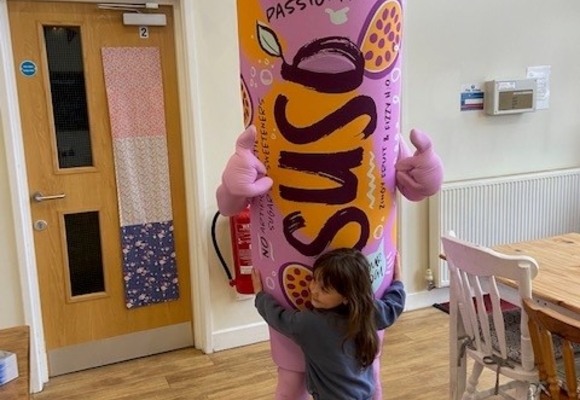What should university caterers be doing about sustainability? A Q&A with Bidfood’s Head of Sustainability, Julie Owst.
At Bidfood, we consider ourselves the experts for all your university catering needs. Whether you’re looking for help with trends and insights, innovation, or menu inspiration, we’re here to help you create the best food offering for your students.
But as well as being a one-stop shop for all your catering needs, we firmly believe in supporting our customers with their sustainability objectives. Our vision is to be a positive force for change, and placing sustainability at the heart of everything we do, we believe that everyone across the foodservice industry can play their part to ensure a greener future.
To find out more about how university caterers can tackle sustainability, we caught up with Bidfood’s Head of Sustainability and Change, Julie Owst.
Should operators be turning more to meat-free menus?
So to be clear, yes – any responsible caterer should be trying to nudge diners away from meat, but it’s not necessarily about meat free menus. Instead, it’s about reducing the proportion of meat sold or the proportion of meat within a dish. So, why not swap out a standard chicken curry, for a chicken and seasonable vegetables or lentils dish? It’s cheaper, uses less meat and as an added bonus, it’s also healthier.
What is also important is to think of customers less as consumers and more as citizens. By involving them in the sustainability conversation, it will encourage participation and get people onside with what you’re trying to achieve, rather than having them feel as if change is being forced upon them. For example, showing the carbon impact of their food choices can empower students to make informed and educated decisions on the food they order.
Should university kitchens be aiming to reduce their food miles?
Yes and no. If it’s about stopping air-freighted produce then it’s an unequivocal yes. But, it’s generally accepted that it’s environmentally better to buy food from where it’s naturally grown, in the appropriate climate and transported (by road, sea or rail), rather than grown in heated greenhouses in the UK. This is because transport emissions typically make up only about 10% of the carbon footprint of food.
However, there are other legitimate motivations for local sourcing such as supporting small local producers, supply chain visibility, as well as building trust and partnerships, but these questions should be answered holistically.
Reducing delivery mileage should certainly be a goal for university kitchens, and having consolidated deliveries with one supplier really helps, as it means frozen, fresh and ambient produce all arrive on the same lorry. At Bidfood, we report on our CO2e per item delivered (0.2309 tonnes), making it easier for customers to calculate the impact of an average delivery.
How can university caterers provide grab-and-go options sustainably?
This is an area which I think is ideal for engagement with the Student Union – try asking the students what they want! Is there an appetite for reusables? And where single use is unavoidable, are there suitable waste streams in place for students to dispose of their rubbish? If you’re using Vegware, you need to know if industrial composting is available, and if so, is it contaminating your recycling?
University caterers should also try to stay clear of offering discounts on reusables. Instead try advertising a reduced price as the headline price (this positions reusables as the norm) and enforce a penalty for single use – psychology is powerful!
And, why not offer a subscription model for regular users such as a bento box or a Tiffin? There is so much scope for creativity within this space, but too often we impose a solution without consulting with users, or worse, assume there isn’t the appetite for change and so do nothing.
Is it important to showcase sustainability on menus and how can caterers market sustainable menu options to students?
I think it comes back to the consumer vs citizens approach, do we think of students purely as consumers (i.e. we make the choices and they eat what we offer), or do we treat them as citizens, empowering them to make choices and giving them a voice in what they eat? It might seem a subtle difference but it’s hugely important. If we position students purely as consumers in this space, it underestimates their potential for driving change, and perhaps more importantly, it makes us as foodservice providers quite passive. However, by engaging with students, giving them choices and better information around new sustainable options, it can help to accelerate change.
Providing positive news is also incredibly important. Selling the benefits of a sustainable diet, rather than inducing guilt, is key to bringing people on board. For example, one way to glamorise substitutes for meat products such as vegetables, beans, fruit, nuts, seeds, is to boast of their nutritional benefit. These types are foods are far better for gut health, which supercharges the good bacteria in your system, meaning you have more energy and better immunity against illness.
A key way of enticing something new is through experimentation and learning. Whether it’s a case of trying new ideas, such as always having one dish on offer that’s advertised as the ‘plant positive’ option, or promoting ideas that aren’t widely used like skin-on chips, which reduces food waste and increases flavour!
What three simple tips would you give university kitchens to help them become more sustainable?
1) Address food waste – the least sustainable food is food that’s thrown in the bin and wasted.
2) Understand your role in educating and influencing students – don’t be passive in this.
3) Harness the power of positivity and psychology by using normalising, context-specific messages










